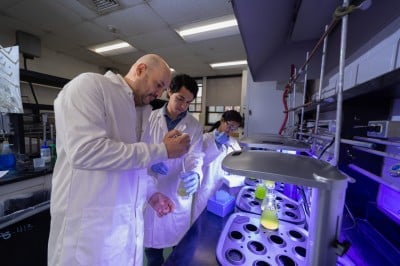Science
UTEP Researchers Enhance Microalgae Biofuel Production Using Nanotech

Research conducted at The University of Texas at El Paso (UTEP) has unveiled a groundbreaking method to enhance biofuel production from microalgae, specifically targeting the species Chlorella vulgaris. This study, published in the journal ACS Applied Bio Materials, demonstrates how nanotechnology can substantially increase yields, offering a promising avenue for sustainable energy production.
The focus of the research is on improving the efficiency of biofuel extraction from microalgae, which are known for their rapid growth in freshwater environments. By employing nanotechnology, the UTEP team has developed techniques that could lead to more cost-effective and efficient biofuel generation. The integration of nanomaterials has shown potential in enhancing the biochemical processes that microalgae undergo during biofuel production.
The research team, led by UTEP scientists, explored various nanostructures and their effects on the growth and lipid production of Chlorella vulgaris. Their findings indicate that these nanostructures can facilitate better nutrient absorption, thus accelerating growth rates and increasing oil yields. This advancement is crucial as the world seeks alternative sources of energy in response to climate change and the depletion of fossil fuels.
According to the published study, the application of nanotechnology could potentially boost biofuel production rates from microalgae by as much as 30%. This increase could significantly impact the renewable energy sector, making microalgae a more viable option for biofuel production. Researchers believe that with further development, this technology could lead to large-scale applications, contributing to a more sustainable energy landscape.
In addition to improving biofuel yields, the research highlights the broader implications of nanotechnology in agricultural practices and environmental sustainability. By optimizing the growth conditions and extraction processes of microalgae, this innovative approach aligns with global goals to reduce carbon footprints and promote green energy solutions.
The UTEP study also underscores the importance of interdisciplinary collaboration in advancing biotechnological innovations. By combining expertise in nanotechnology, biology, and environmental science, the team has opened new pathways for research and development in renewable energy fields.
As the demand for sustainable energy continues to grow, the findings from UTEP could play a vital role in addressing energy challenges. With continued research and investment, microalgae biofuels may become a key player in the future of renewable energy. The implications of this study extend beyond the laboratory, offering hope for a cleaner, more sustainable energy future for communities worldwide.
-

 Lifestyle5 months ago
Lifestyle5 months agoLibraries Challenge Rising E-Book Costs Amid Growing Demand
-

 Sports5 months ago
Sports5 months agoTyreek Hill Responds to Tua Tagovailoa’s Comments on Team Dynamics
-

 Sports5 months ago
Sports5 months agoLiverpool Secures Agreement to Sign Young Striker Will Wright
-

 Lifestyle5 months ago
Lifestyle5 months agoSave Your Split Tomatoes: Expert Tips for Gardeners
-

 Lifestyle5 months ago
Lifestyle5 months agoPrincess Beatrice’s Daughter Athena Joins Siblings at London Parade
-

 Science4 months ago
Science4 months agoSan Francisco Hosts Unique Contest to Identify “Performative Males”
-

 World5 months ago
World5 months agoWinter Storms Lash New South Wales with Snow, Flood Risks
-

 Science5 months ago
Science5 months agoTrump Administration Moves to Repeal Key Climate Regulation
-

 Business5 months ago
Business5 months agoSoFi Technologies Shares Slip 2% Following Insider Stock Sale
-

 Science5 months ago
Science5 months agoNew Tool Reveals Link Between Horse Coat Condition and Parasites
-

 Sports5 months ago
Sports5 months agoElon Musk Sculpture Travels From Utah to Yosemite National Park
-

 Science5 months ago
Science5 months agoNew Study Confirms Humans Transported Stonehenge Bluestones









